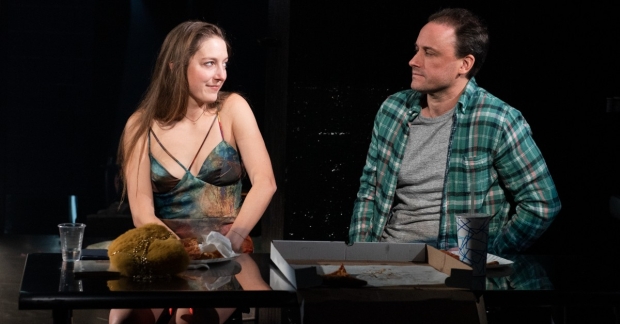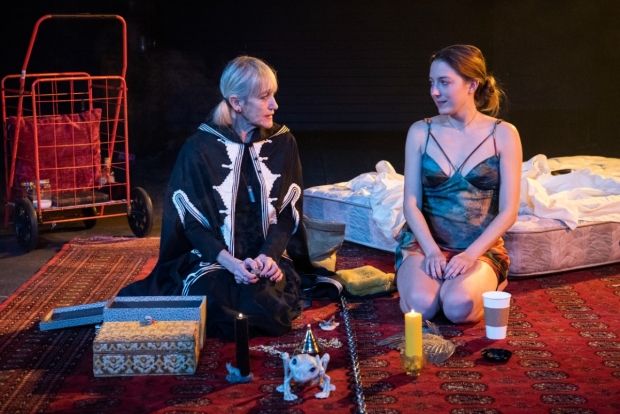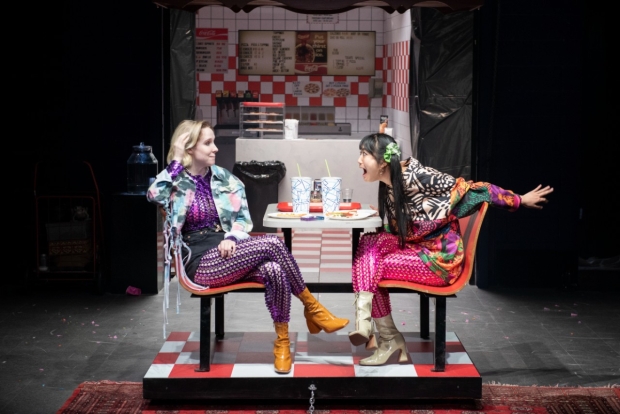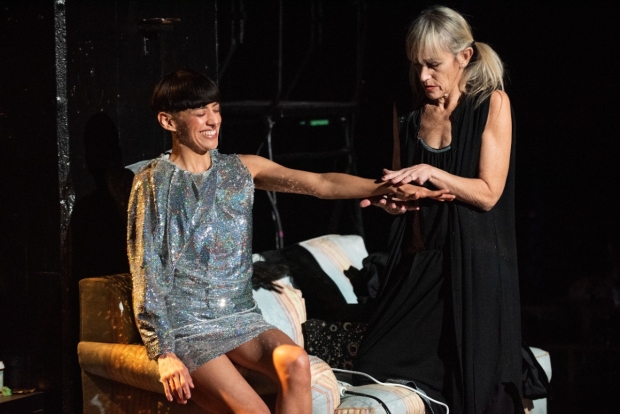Review: Clare Barron's Shhhh Asks Us to Point Where It Hurts
Sexual trauma, witchcraft, and A.S.M.R. come together in this world-premiere play at the Atlantic Theater Company.

(© Ahron R. Foster)
Clare Barron is not a gentle storyteller. From You Got Older, a play about a parent's mortality existing alongside a daughter's sexual fantasies, to her Pulitzer Prize-nominated Dance Nation, a play about the primal agony of female adolescence, her work pushes the limits of discomfort and more often than not, exorcises a few demons that have been clawing away at her characters' insides.
Despite the pacifying title of her latest work, Shhhh, now making its world premiere at the Atlantic Theater's Stage 2, this one is even more discomfiting than the rest. While Barron's past works teeter on the edge of an abyss, thrilling their audiences with the incredible feat of remaining upright, Shhhh fumbles through painful vignettes without a trace of safety, or a guiding hand to reassure us that we're journeying toward something — even if that something is less than solid ground.
Sturdiness and stability are certainly rarities in the unsettling world that Barron has created (and also directs and stars in). She plays Shareen, a TV writer with a chronic but undiagnosed illness whom we watch swerve between an unhealthy sexual relationship and a platonic friendship with an under-accomplished creative named Kyle (Greg Keller giving a believable performance as your average impassive man-child). Instead of perpetuating the theatrical tradition of eloquently verbalizing one's tortured romantic struggles, Shareen's commentary (and onstage activity) is largely relegated to the topic of bodily fluids. She tends to sudden nose bleeds, recounts a burst of mid-sex diarrhea to her sister Sally (Constance Shulman), and spends most of her first scene with Kyle sneezing away while he regales her with a gruesome tale about a speedboat accident (nothing gets an audience's emotions engaged like the detailed description of a physical maiming).

(© Ahron R. Foster)
Instead of making her characters emotionally vulnerable, she makes them physically vulnerable, stripping them and their bodily functions as bare as possible in this tiny performance venue (a stark shadowy space lit by Jen Schriever and designed by Arnulfo Maldonado who hangs a laid-out model of a gutted body from the ceiling as the performance's centerpiece). As Kyle, Keller is forced to endure a particularly shocking physical scene, one that is both difficult to watch and impossible to imagine having to do eight times a week.
Like a live exploration of the mind-body connection, physical symptoms become the manifestation of psychological trauma, while much of this suffering proves to be rooted in the transgression of physical boundaries. Nina Grollman and Annie Fang appear for a single standout scene as Francis and Sandra, a pair of irreverent young women who swap stories of physical violations over a casual slice of pizza. Costumed in the play's only shock of color (designs by Kaye Voyce), they vacillate between detachment and righteous anger, while Shareen eavesdrops and betrays an emotional anguish that can only come from shared experience (a lovely performance moment from Barron).

(© Ahron R. Foster)
Meanwhile, Shareen's sister Sally gravitates toward the active manipulation of emotions through physical stimulation — even taking on the mystical name Witchy Witch (as she is listed in the program). Shulman's deliciously unique speaking voice is put to use as a character who creates A.S.M.R. videos, joining people's minds and bodies through this modern kink (perfectly crafted sound design by Sinan Refik Zafar), while spending her days as a postal worker who gets a thrill from crossing the threshold of people's private homes. We also watch as she sexually pursues Penny (Janice Amaya), luring them with the promise of an electric shock machine that can "either tickle or hurt" the recipient of its volts.
Barren toys with this line between pleasure and pain, and in her messy anarchical way, shows how their differences are not as well-defined as we would think. Explored in conjunction with the hazy line between the physical and the emotional, and the more commonly discussed issue of consent vs. violation that has flooded the #MeToo era, Barron packs a metric ton of confounding dichotomies and paradoxes into a single piece of rebel theater.
Shhhh is raw and ambitious, and because of Barron's threefold duties as writer, director, and performer, the play is steeped in her singularly brazen voice. However, it is also left without the sense of shape and momentum that comes from an objective outsider's eye. Stage pictures occasionally feel more awkward than intended (a strobe-lit dance break never hits the level of raucous energy it's aiming for), and scenes leave you hanging in discomfort one after the next with no sense of a cohesive picture in Barron's theatrical collage.
Of course, Barron does not owe her audiences an ounce of safety, reassurance, or comfort. The title Shhhh seems to almost anticipate such complaints and tells you to pipe down while you board this rickety ride. So before you strap in, ask yourself if nearly two hours of quiet discomfort will tickle or hurt.

(© Ahron R. Foster)









